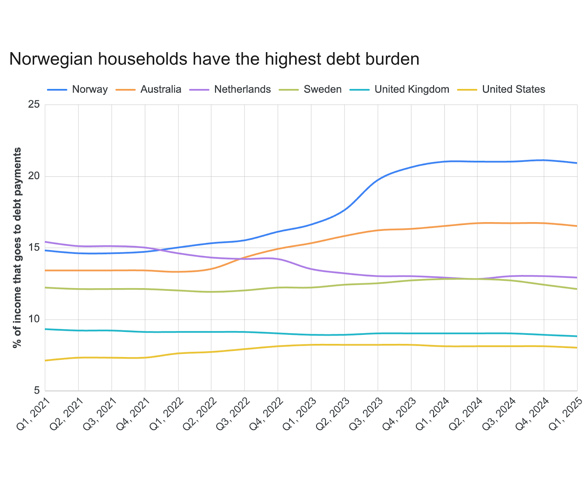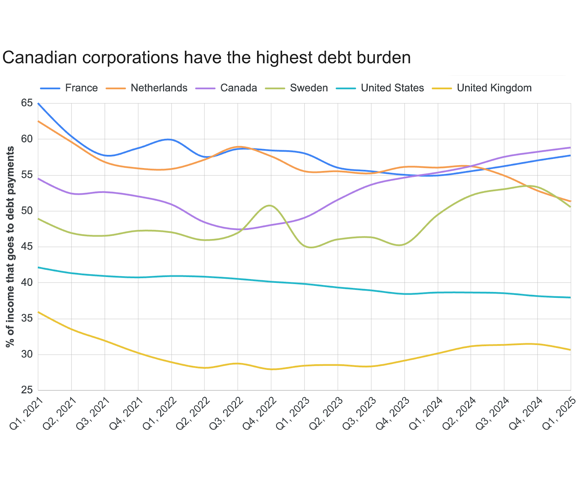What makes a place a "financial capital of the world"? I would argue that it is some combination of:
- How much money is controlled there.
- How much money moves through the place.
In practice, this breaks down to:
- Assets under management
- Issuance of equities and debt (both bonds and loans)
- Total trading volume
There are a few organizations that rank the financial capitals of the world, but I haven't found any recurring report that focuses purely on these factors. For example, The Global Financial Centres Index is probably the most well known ranking system. However, a large part of its ranking criteria is a survey of people who self-report as working in finance. Also, in addition to things like financial markets turnover, their criteria contains factors like:
- World Bank "Average precipitation in depth"
- World Bank "life expectancy at birth"
- Mercer "Quality of Living City Rankings"
- Climate Bonds "Sovereign Green Bonds"
- Yale University "Environment Performance"
Those things are nice, and make for a place nice to live. However, I don't believe they make a place a financial capital of the world.
Without further ado, let's get into it!
Tiers
I'll get right to the point. Here are my personal "Global finance center" tiers:
Tier 1 - New York City
Tier 2 - London
Tier 3 - Shanghai, Shenzhen, Hong Kong
Tier 4 - Frankfurt, Paris, Amsterdam, Tokyo, Mumbai, Sydney
Note: This article contains charts from a presentation I gave about London, and whether it remains an important financial hub. So, some of the charts are London-centric.
Equities
There are two countries that really matter, when it comes to equities right now: The United States and China. India is also starting to make a name for itself in this regard, but still has a ways to go.
For example, here is a 2024 year-end report from Dealogic, showing that the US and China are in a league of their own when it comes to raising money on equity capital markets. China had a hiccup in 2024, but recent IPO reports from Bloomberg show that China is bouncing back in 2025, so I consider the weak 2024 to be a blip.
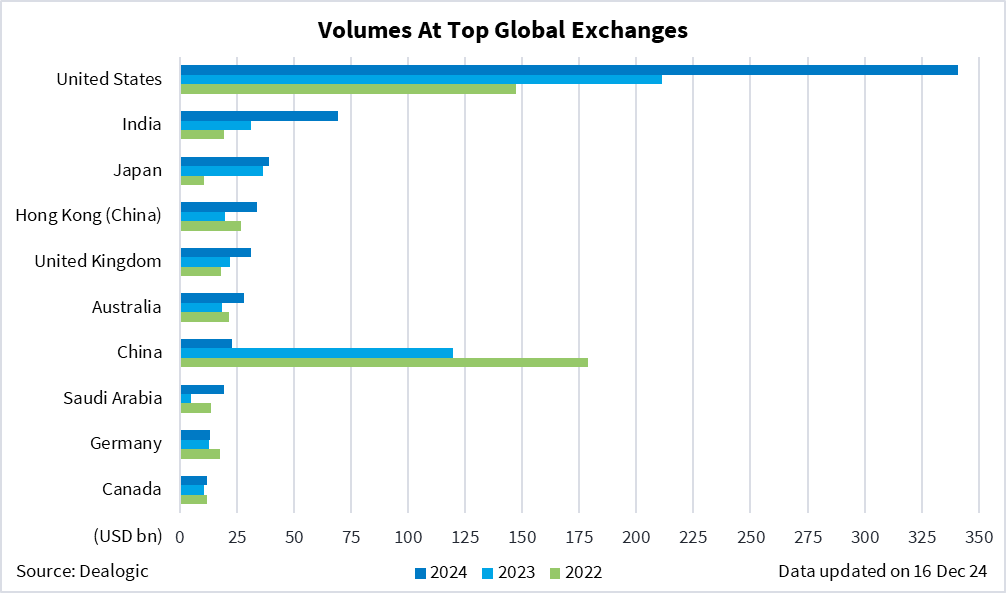
Issuance is the process that companies go through to raise money by selling shares, but it isn't the only important factor. I also think trading volume is important. I downloaded data from the World Federation of Exchanges and combined it with monthly reports from the London Stock Exchange to create the following graph. As you can see, The USA and Chinese exchanges far exceed the trading volume of other important exchanges:

As you can see, in both issuance and trading volume, the USA and China are the clear world leaders in equity capital markets. This reflects the fact that, anecdotally speaking, most "growth" companies that get investors excited to own shares in, are coming from those two countries.
Bonds
Bonds are another important source of capital for companies as well as sovereign governments. London shines here as the most important venue for raising capital from international institutional investors. Below is a chart showing where the most international bonds are issued. Please note that this does not mean that the following countries borrow the most money, it means they are the most popular venue for selling that debt.
In case you're unaware, and international bond is when a company or government raises money by issuing bonds to investors all around the world, frequently in a currency other than their own.
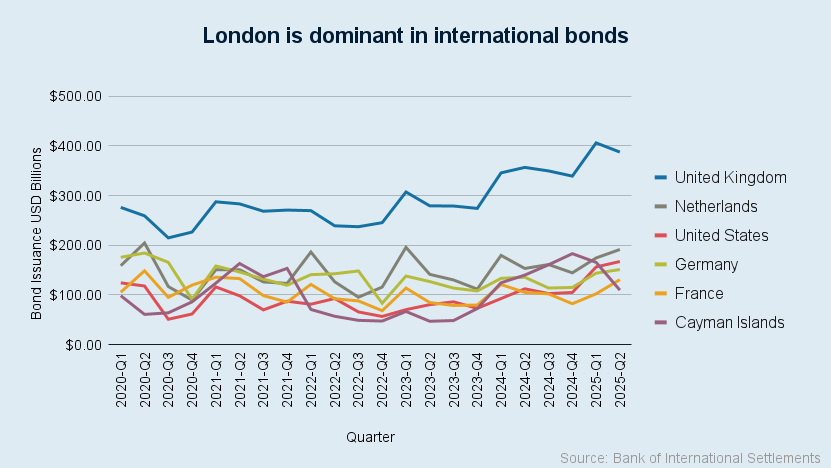
Forex (FX)
Whenever you do business abroad, there's a good chance you're going to need to exchange currencies. Once again London shines as the dominant place to exchange foreign currencies. There are several kinds of FX transactions broken out by the Bank for International settlement's (BIS) dataset, and London is top in all of them.
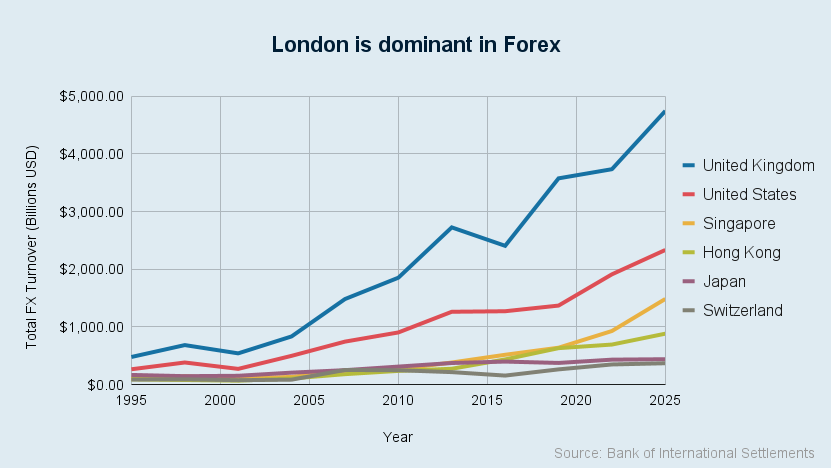
The most basic form of FX transaction is "Spot". An example of this would be "I give you dollars, and you give me Euros, now."
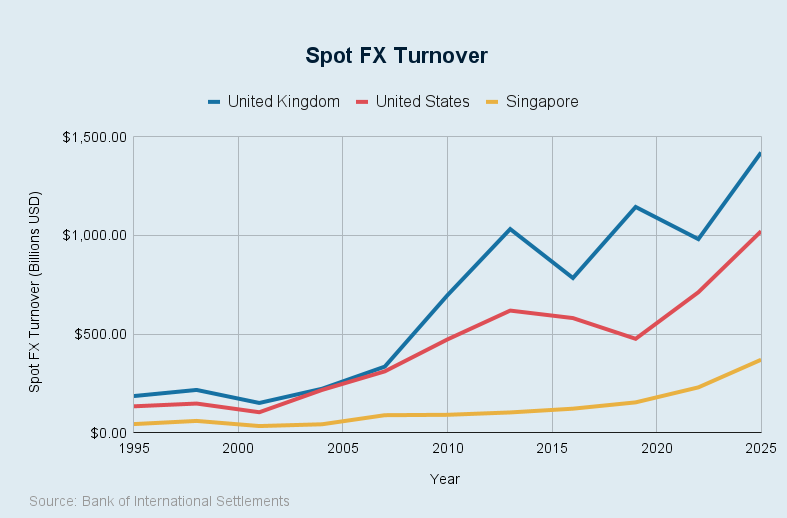
There are three other types of FX transaction broken out by the BIS' dataset: Swaps, Forwards, and Options. There are many reasons to place these other, more complex types of trades, such as hedging against FX risk in long duration business deals, or pure speculation. I won't explain them here, but generally speaking, these are more sophistcated transactions. Once again, London domaintes.
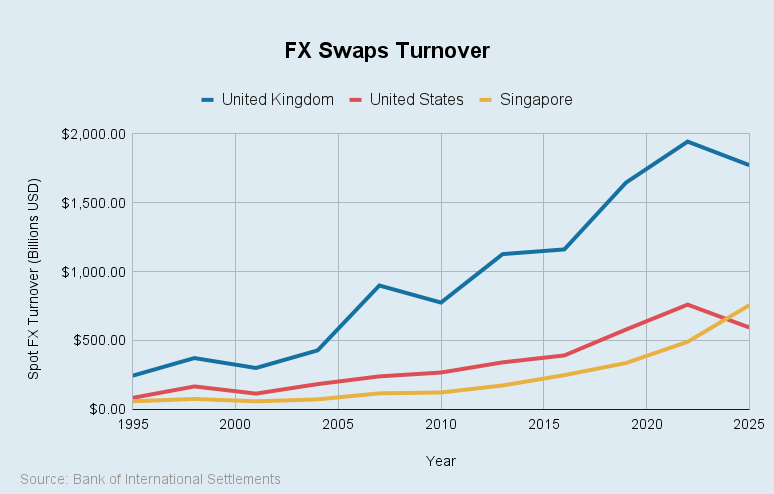

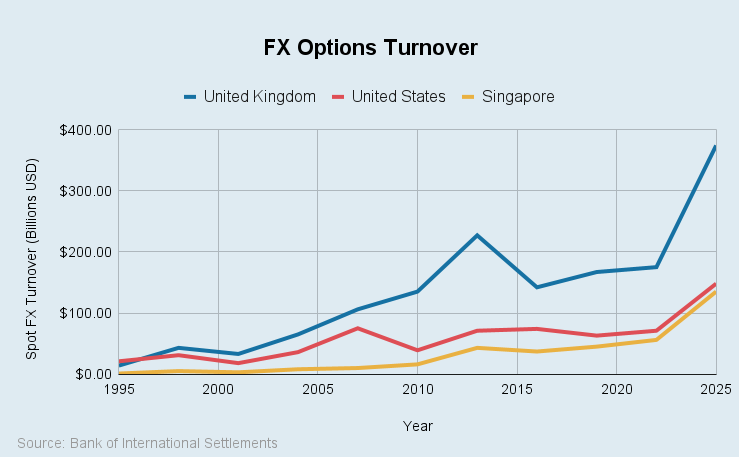
In conclusion, London is the dominant place that large institutions come together to trade currencies.
Derivatives Swaps
Derivatives swaps sound like something that only finance wizards understand, but actually, they can be quite simple. An example of a derivatives swap might be "Bank A has a loan on its balance sheet with a fixed interest rate. Bank B has a loan on its balance sheet with a variable interest rate. Bank A has a higher risk appetite than bank B, so they trade interest rate payments on their loans." In this example, it is a way to trade illiquid debt assets.
Still with me? OK. London is the most popular place to do this, with New York in second place. Especially "derivative swaps".
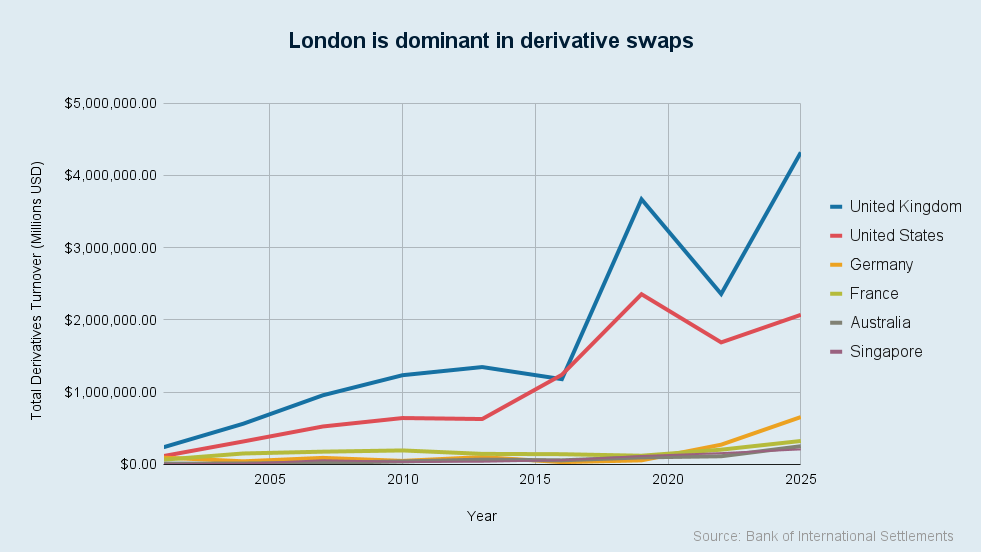
Cross border lending
London used to be the global capital of cross border lending, but it took an enormous hit in the global financial crisis:
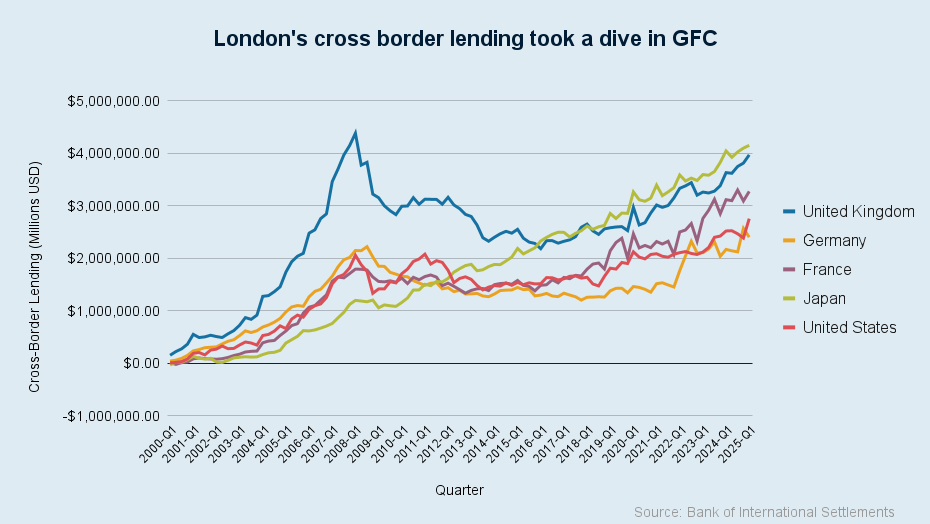
However, if you re-draw the line at Q1 of 2020, London has since regained the lead on cross border lending:
.png)
London, Frankfurt, Paris, Tokyo, and New York City are all in the running to establish a lead in the cross border lending game. However, London recently regained the lead after years of decline due to the global financial crisis. If I had to guess, it will probably extend its lead over time and regain its position as the dominant global lender.
Fintech
I found three major players in the global Fintech ecosystem: The San Francisco bay area, New York City, and London.

Surprise! San Francisco is the top place for tech companies. New York and London trade blows for second place.
Investment Banking
Most of the activities discussed above (stock and bond issuance, institutional lending, etc) will generate fees for investment bankers. So, I believe investment banking fees collected by region provides some insight into how important each global financial center is. Unfortunately, I couldn't find any reports on IB revenue broken out by city, only general region. However, it is still informative data.
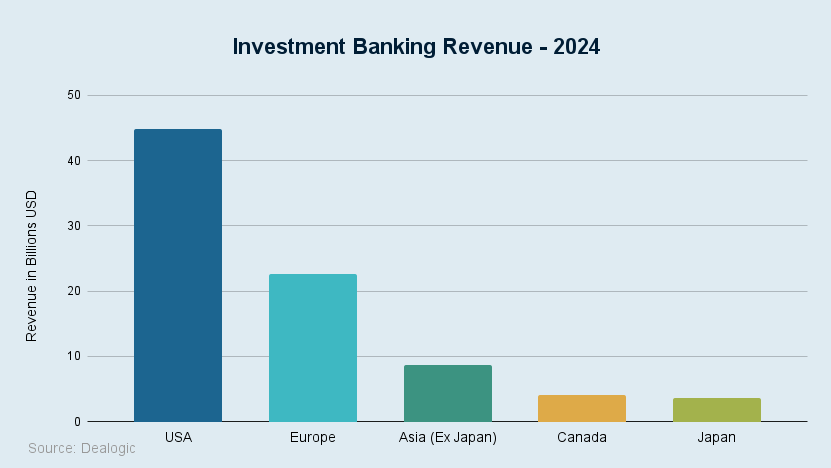
As discussed, New York and London are the epicenters of wholesale financial activities in the USA and Europe, respectively. I find it likely that the ratio of IB revenue between New York and London is probably similar to this graph. Maybe 2 to 1.
Final rankings
Here is my shortlist of "places that matter", for each of the categories discussed.
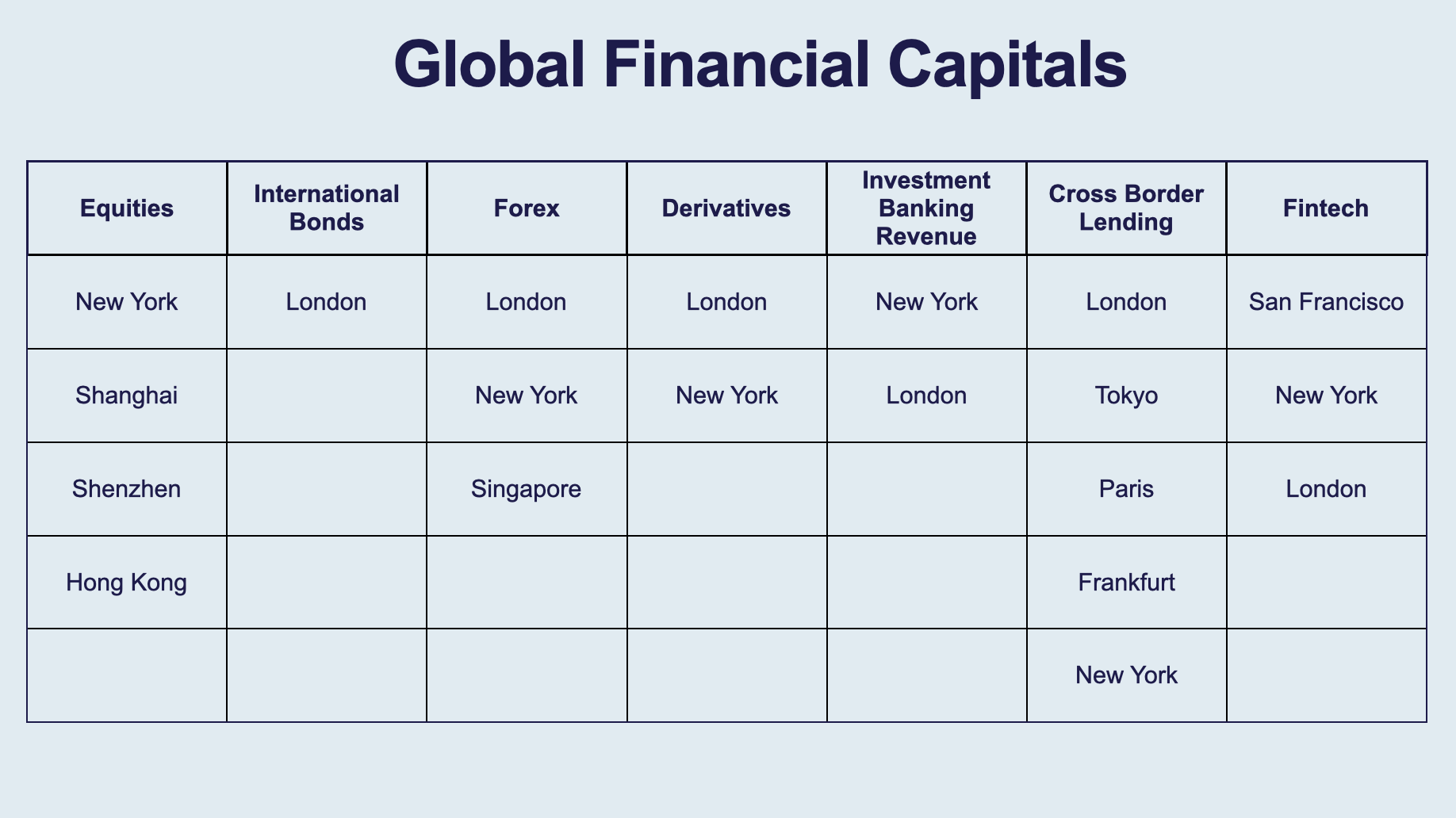
Methodology
Equity trading volume: I used the World Federation of Exchanges statistics portal to export data on total turnover volume for NYC, Shanghai, Shenzhen, and Honk Kong. I combined this data with the London Stock Exchanges monthly trading volume reports.
Bond issuance: I downloaded data from the Bank for International Settlements International Debt Securities Report and performed manipulation with SQL and Google Sheets to filter and sum for the desired information.
Forex / derivatives swaps: I downloaded data from the Bank for International Settlements Triennial Survey and performed manipulation with SQL and Google Sheets to filter and sum for the desired information.
Cross border lending: I downloaded data from the Bank for International Settlements Locational Banking Statistics Report and performed manipulation with SQL and Google Sheets to filter and sum for the desired information.
Fintech:
To find fintech companies with $100,000,000 in revenue, I:
- Subscribed to Crunchbase
- Filtered all companies by "Industry -> Fintech"
- Filtered to only view companies by "Estimated revenue > $100 million"
- Filtered by headquarters location
Investment banking revenue:
All numbers came from Dealogic's investment banking scorecard.


![Financial Capitals Of The World [Statistics]](https://cdn.prod.website-files.com/69086bc28150b5805514ca9f/691359b7f22648f4efd073d2_Financial%20Capitals%20Featured%20image.png)
